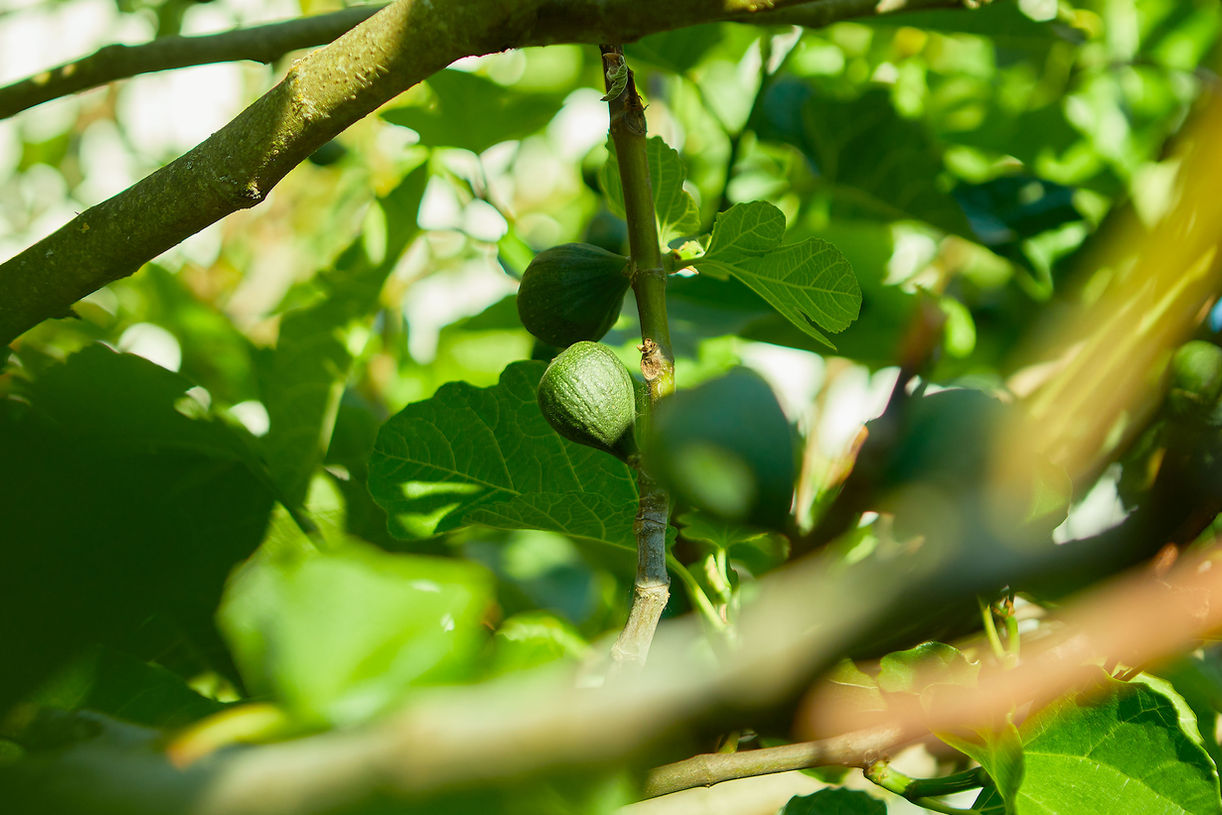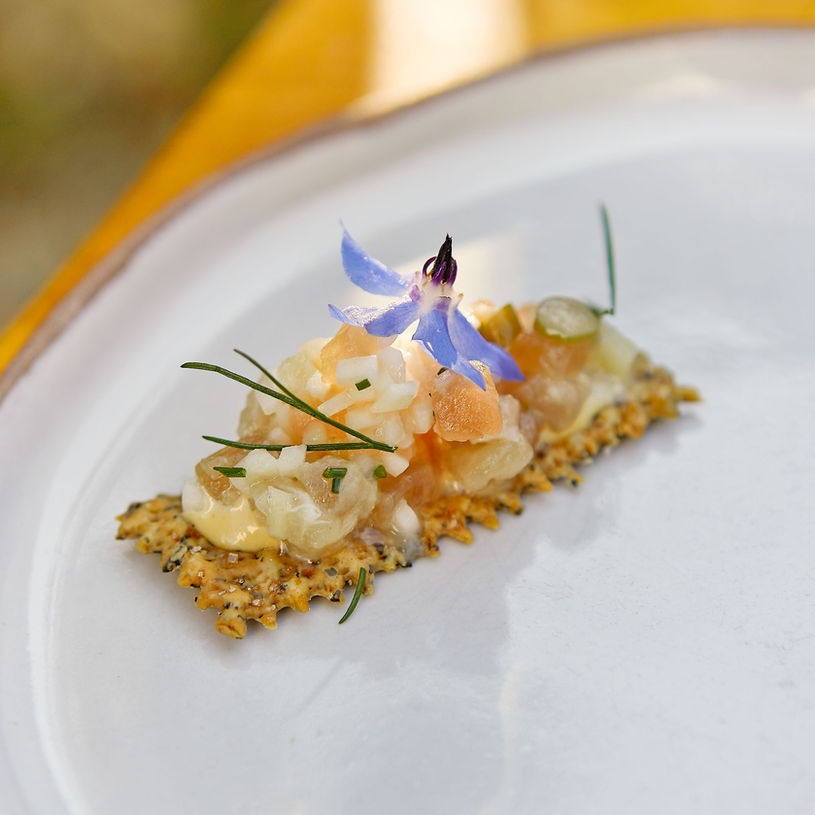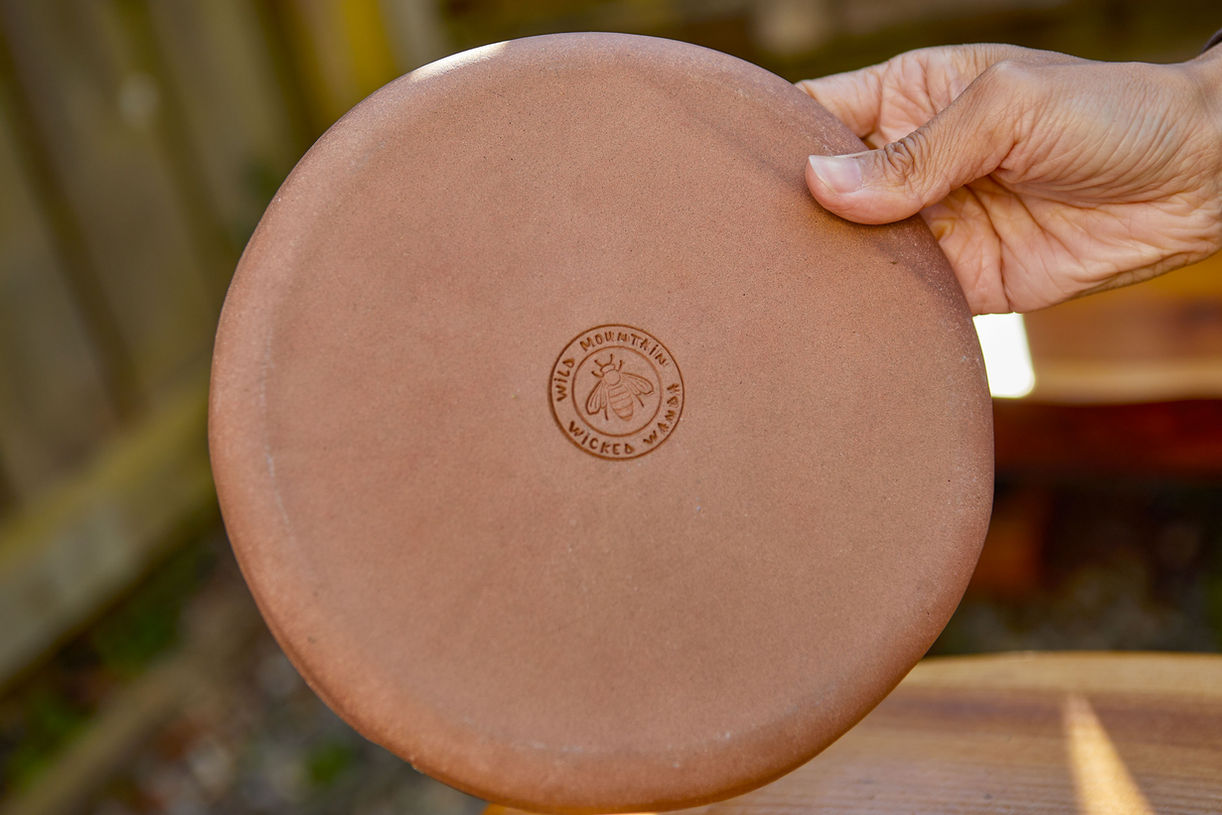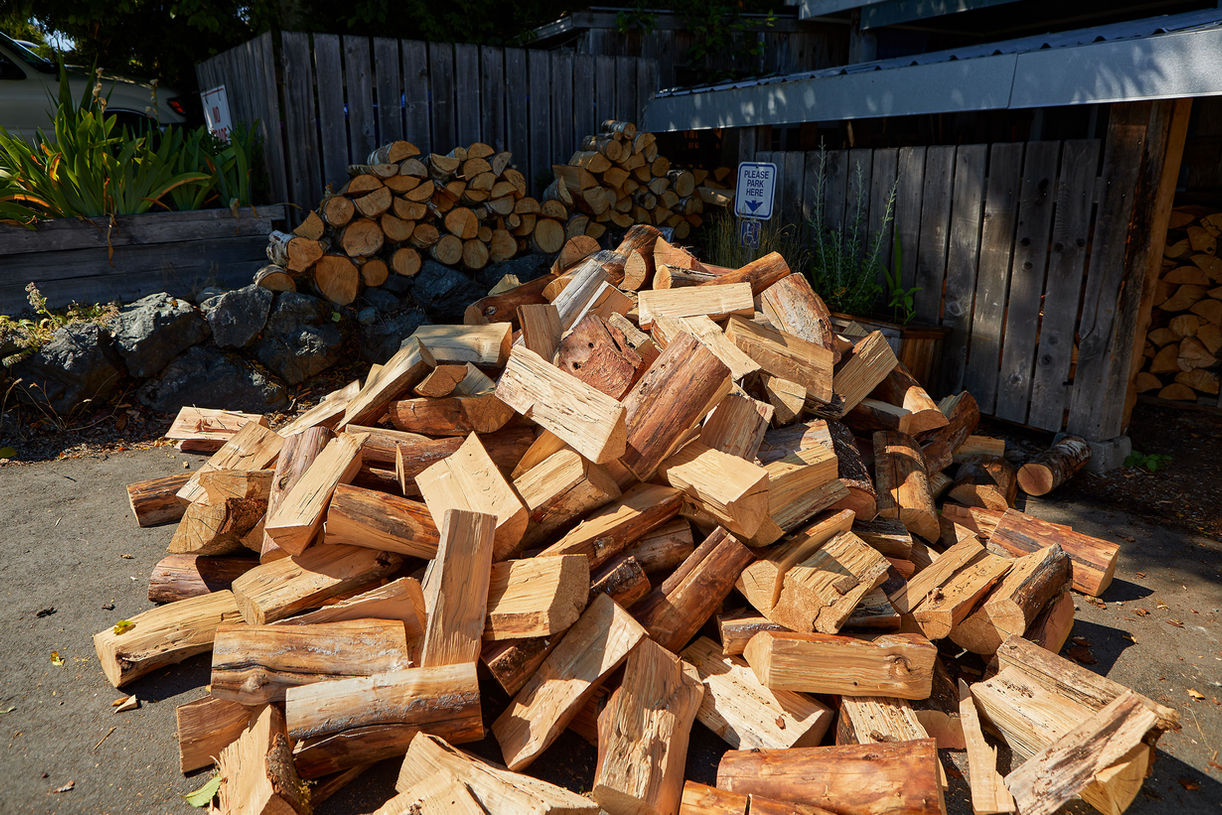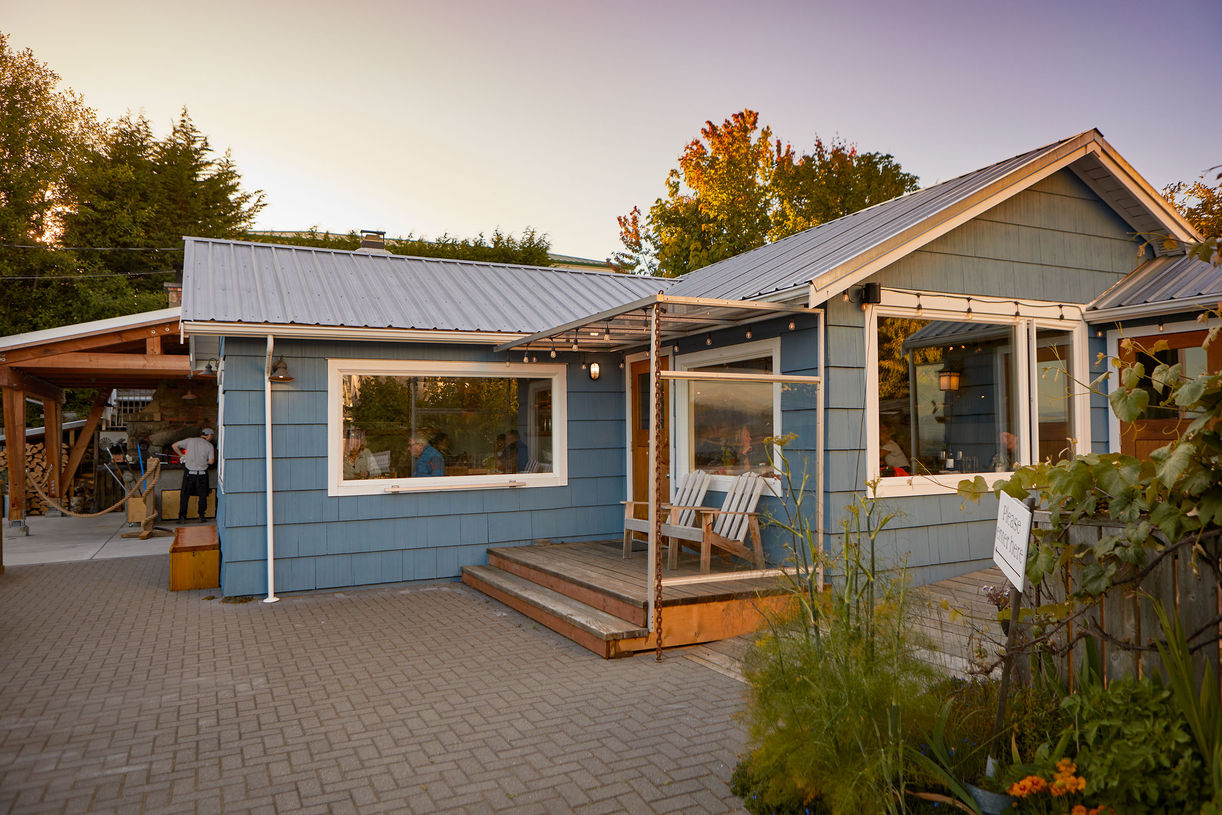Photography - HIRO
Text - MINA
Photography - HIRO
Text - MINA
Wild Mountain
Oliver Kienast, Chef-Owner
Credits
Photography - HIRO
Interview - MINA
“Wild Mountain is about community and relationships. It is about bringing those things together and having a restaurant around it."
Nestled on a serene hillside, with a breathtaking view of Sooke Harbour, lies a quaint little restaurant known as Wild Mountain. Here, hummingbirds and bees flit through the kitchen garden, while the gentle sea breeze sweeps across the patio. The restaurant's inviting ambiance is accentuated by a stone-built wood-fired oven at the entrance, warmly welcoming guests. At Wild Mountain, every element seems to embody the essence of what they proudly call "Slow Food."
The Slow Food movement, a counter to fast food culture, champions the idea of embracing traditional ingredients and locally sourced produce to enrich one's way of life. For Oliver, the owner and chef, the concept of Slow Food has resonated with him since his childhood in northern Okanagan. So interested was he about Slow Food that when the opportunity arose to visit a local Slow Food farmer during a school excursion, he was the first to sign up. Today, as a chef, his culinary creations revolve around the flavors of his cherished childhood memories. "Among chefs, we often reminisce about our first food experiences, and for some of us, it was that moment of picking fresh raspberries in the garden. The taste was so remarkable and bursting with flavours, imprinted into our brains. If we can bring that experience to our guests' tables, we've won," said Oliver.
The ever-changing menu at Wild Mountain reflects a collective tapestry of stories from the relationships Oliver has forged with local farmers, cheesemakers, and foragers. Each dish reflects the hard work, love, and devotion of these passionate partners, and savoring the refined Slow Food crafted by Oliver evokes a sense of gratitude. Diners at Wild Mountain are sure to encounter the finest flavors of tomatoes, the essence of meats, and the richness of sauces - a journey of flavours to be cherished as a loving memory, compelling them to return to Sooke for more.
To experience the wonders of Wild Mountain, reservations are highly recommended as they only open their doors for dinner, on four days of the week. Also, secure your time there to appreciate the serene ambiance, the delicate arrangements of fresh flowers adorning the tables, and the engaging conversations with the friendly servers over the thoughtfully prepared dishes.
Much like Wild Mountain's gradual growth and strong local connections, they will continue to offer the joy of eating, embracing each season with care. In the heart of Sooke, Wild Mountain stands as a culinary sanctuary, celebrating the pleasures of Slow Food and offering people a delightful dining experience to be savored long after the last bite.
VOICE (V): How did Wild Mountain come about?
Oliver(O): I grew up on a honey farm, and my parents were both beekeepers in North Okanagan near Armstrong. So the name Wild Mountain is an ode to my parents' honey farm in the same name. It was a humble beginning, living in a one-room rustic shack without electricity or plumbing. I might have been a beekeeper if I were not allergic to bees! It is a kind of irony of it because it has made me who I am. I was always fascinated by cooking, too. The flavours of my childhood were fresh fruits and vegetables from my mother's and grandmother's gardens, and my dad would barter the honey with the meat. Those were the flavours so prominent and electrifying in freshness in the season, and they would greatly influence my style of food later. As a young adult, I moved to Victoria to pursue cooking. I did my apprenticeship at Cafe Brio, a farm-to-table restaurant with Slow Food values, and it was the first time cooking in the city where I connected those dots of being a part of the community, sharing what you grew with the neighbors, and cooking with passion. So when I tasted the food at Cafe Brio, I realized that was what I was missing. Then I learned about the Slow Food movement and its idea of seasonally sourced food and looking at food as a political act; if you support the right people, you are participating in the right food system instead of encouraging the global and industrial food system. I decided that it was my path to follow those two kinds of ideas on how you support an ethical local economy but also create delicious food. It took me around 12 years to start my little place after cooking for various restaurants and saving money.
V: Why did you choose Sooke as a restaurant location?
O: I had moved to Sooke to work at Sooke Habour House. I resonated with their Slow Food politics and eventually started working at their restaurant. I met my wife, Brooke, there. After living here in Sooke as a chef for a decade, establishing relationships with the farmers, fishers, foragers, and all the people who bring the food, I genuinely knew who grows the best tomatoes, where to pick the wild mushrooms in the forest, and who to talk to about this and that. Having those relationships allows me to celebrate the natural world and cook delicious food from the beginning. Now that I am not only a chef but an owner of a restaurant, I can support them in different ways. The Relationship Barometer is a total Slow Food model where you branch out and make yourself and other people around you stronger. There is real economic and emotional support and appreciation for each other. It is a lovely thing to be around. It takes so many different businesses and people to open the door and sell the menu at Wild Mountain.
V: What was the first menu you created at Wild Mountain?
O: It was just with what I could get from the farms! I was more ambitious back in the day, so my menu was a bit bigger than today. I create a menu by looking at the weekly list of vegetables from the farmers and figuring out how to fit in the quantity and types of vegetables I receive for the week with the ratio of customers I serve. It sounds crazy in a way, but still, it all works out in the end. It allows me to use local food almost 100% of the time. Some inaccessible items like onions during the winter months, lemons, olive oil, and hard cheeses from Italy are about the only things we would go out of our region for.
Now we offer wood-fired pizza with a nice Slow Food story behind it, too. We use natural yeast, and the wheat is from our pig farmer who started growing it to feed his pigs and then milled it in Metchosin. We cook pizza over the fire with Charcuterie we make here. It is also interesting to take a 'common' food and to do it with finesse. I also want to cook with the fire because it makes you feel good and secure. It is not only the flavour aspect. When people come to the restaurant and see the fire, their faces light up instantly. These are the ways I can create an experience. I am trying to have a place where people can come and have something as easy as cheese pizza or a more complicated menu, but either way, there is a story behind it.
V: What's in for the August menu?
O: Beans, strawberries, and blueberries. We will start seeing tomatoes, eggplants, cucumbers, and all the summery vegetables. There will be more raw things on the menu; crudités, beef tartare. We love to serve falafel in tomato and eggplant season and this year our amazing Sous Chef Scott Wood made mutton donair with meat from Parry Bay Farm in nearby Metchosin to go with that dish.
V: Tell us about the Slow Food Chef's Alliance you are a member of.
O: Right before Wild Mountain, I attended a Slow Food conference in Italy called Terra Madre. The idea was to ally with a group of like-minded chefs coming together in more ways than just sharing ideas or putting events together but for emotional support. One time a group of Slow Food chefs from BC gathered at my friend Jesse’s place, Pilgrim on Galiano Island, and we ate, talked, and shared many things like how to have a zero-waste kitchen, move the industry forward and be a better steward of the planet. We all try to support each other instead of being competitive.
V: Why are you open only four days a week for dinners?
O: It is to have a work-life balance. We are always here for long hours, so we decided that if we want to survive, we must think long-term. The other three days are the days we prepare for our business which includes driving and picking produce at the farms, butchering the whole animals, making all the stocks, and having to render all the fats because we cook the animals in the same fats. There are so many steps to get to the opening and have a strong food program. It also lets our staff take a little break, and they return feeling refreshed to work hard and long hours. Those three days are also for me to discover and scout new farms. In those moments, I can grow as a chef.
V: What are some of the sustainable practices in the kitchen?
O: We compost everything that will go back into our farmers or staff’s gardens. We save little scraps for pigs and chickens that our farmers raise, so there is not much food waste here. Stems of herbs can become a part of stocks. It is always interesting to see little things you don't often use can still be a part of our cuisine. For instance, we naturally ferment our own hot sauce and then dehydrate the leftover pulp to make our own fermented chili powder.
V: What role does Wild Mountain play in the community?
O: It is significant when I look at the numbers at the end of the year and how much money we give back to the community. Also, people who work for us and learn our philosophy, would go out in the world and hopefully reciprocate that to the people around them. It is not all about making money in this world. It is about having a good quality of life and good relationships. To the young people who come and work for us, that is the biggest influence we can have.
V: Any advice to people who like to start a Slow Food restaurant?
O: It is worth it. It brings riches and quality of life. Through my culinary journey, I have met the most interesting and lovely people who have become friends that are dear to me. I would not have traded that for making a little more money by buying from big companies. Variety is the spice of life – an array of characters and tastes you get going down that road. There is usually a loss of flavour when you do something based on money. When you adopt a Slow Food ethos, you will get not only a tastier life but also a happier and healthier life.
V: What is the best thing about Sooke?
O: Our community bridges the land and ocean. We have fish, shellfish crustaceans and seaweed from the ocean, a forest full of mushrooms, berries and blossoms and edible things growing along the seashore. The wild foods really come together when we cook them with fire, which has become a big part of my identity.
V: What is one change you like to see in the community?
O: Big changes are coming to the community, and I wish it could adopt more of the values from Citta Slow (an off-shoot of Slow Food) and stop the opening of fast food restaurants and box stores.
V: Can you share your favorite hangout place in Sooke?
O: We love Sooke Potholes, beach fires, watching the sunset and cooking on the beach with friends and our dog Mitzi, is the best.




